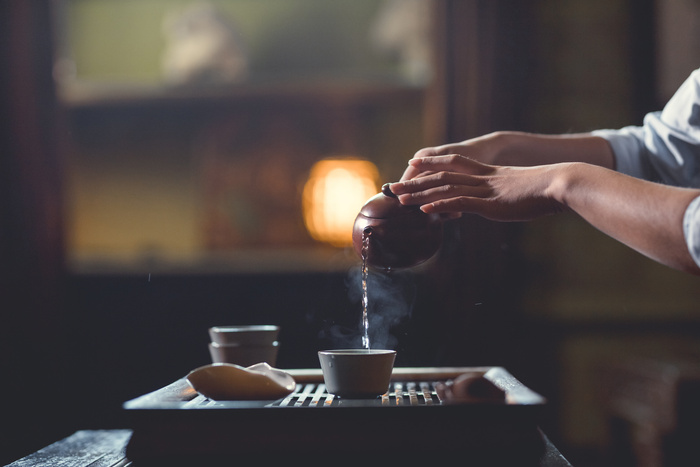Translated By Tara Lau
When I first became a monk, I used to think that for Zen practitioners to drink tea every day to refresh themselves was rather an undesirable habit, an obsession and perhaps an addiction, until one day I chanced upon The Collected Poems, Gathas and Odes by Xu Yun the Old Monk, when I realized the meaning of the saying, “A Zen master cannot live a day without tea”. This legendary ascetic (1840-1959), one who was steeped in all the five Zen sects, did have an entrenched tea-drinking habit. One of his series of poems about mountain living concerns the joy of making tea,
“An intent for mountain dwelling reaches far afield, open, boundless and free.
Take pine roots as makeshift pillows, and when waking up alone, make tea.
No visitor comes to a mountain residence, a bamboo trail locking in the haze.
Clear is the shallow water facing the gate. A few flowers flutter in the breeze.”
In mountain woods far away from the secular world, to sip a pot of light tea made by oneself right after waking up, and then sit in a padmasana and attain serenity, it is so interestingly full of Zen. Further, Master Xu Yun not only loved to make tea, he also knew how to pick it. Here is what he wrote in a timeless piece, fittingly titled Picking Tea,
“With my busy life in the mountain making a living, I pick pepper and I pick tea leaves.
If nothing else being amazing, awesome tea buds sprout overnight in a spring breeze.”
Tea aficionados like to say that the tea ceremony has a virtue of simplicity and unpretentious frugality. The master’s humble mountain life gives such full play to this virtue, with its involvement of Zen from planting, picking and making tea to welcoming guests to musing over yesteryear.
Since ancient times, tea has been closely connected with Zen. Many Buddhist temples run meditation classes as a routine, and since it is a taboo for meditators to be drowsy, tea with its refreshing quality has naturally become their ideal drink.
After the Tang and Song Dynasties, due to the prosperity of Zen Buddhism, drinking tea by Zen monks became a fashion. According to the “Tang Dynasty Fengluo Insights”: “In the middle of Kaiyuan, there were masters of demon subduing and Zen teachings in Taishan…all allowed them to drink tea…cook and drink everywhere. From then on, they followed suit and it became a custom.” Buddhism gradually became a custom. Tea drinking and tea serving were standardized, and their etiquette was included in the “Chanyuan qingguiand” and “Choku-shu-hyaku-jo-shin-gi”. Each monastery has set up a “tea hall” to welcome guests or serve as a place for monks to discuss Buddhism; it also has a “tea head” monk, who is responsible for boiling water and making tea. There is a “tea drum” in the Dharma Hall, which is specially used to beat the monks when summoning them to “make tea” or “offer tea”.
Legend has it that Lu Yu, the “Tea God” of the Tang Dynasty, was an orphan. He grew up in a Buddhist temple and was raised by Zen Master Zhiji. He often made tea for him. Later, he traveled to famous mountains and temples all over the country, personally picked tea, made tea, and tasted tea. He also extensively integrated the tea ceremony experience of monks and lay Buddhists, and then wrote the world’s earliest tea ceremony monograph – “Cha Ching, The Classic of Tea”.
Zen is anywhere and everywhere. In other words, life is Zen. Monks should not only focus on one place when sitting in meditation, but also maintain mindfulness on ordinary things such as drinking tea, eating, dressing, etc.
The Zen Buddhist scripture “Diamond Sutra” says: “All dharma is Buddhist dharma.” Therefore, if “dharma” is captured in one mind, eating food is also dharma, and drinking tea is also inseparable from dharma.

